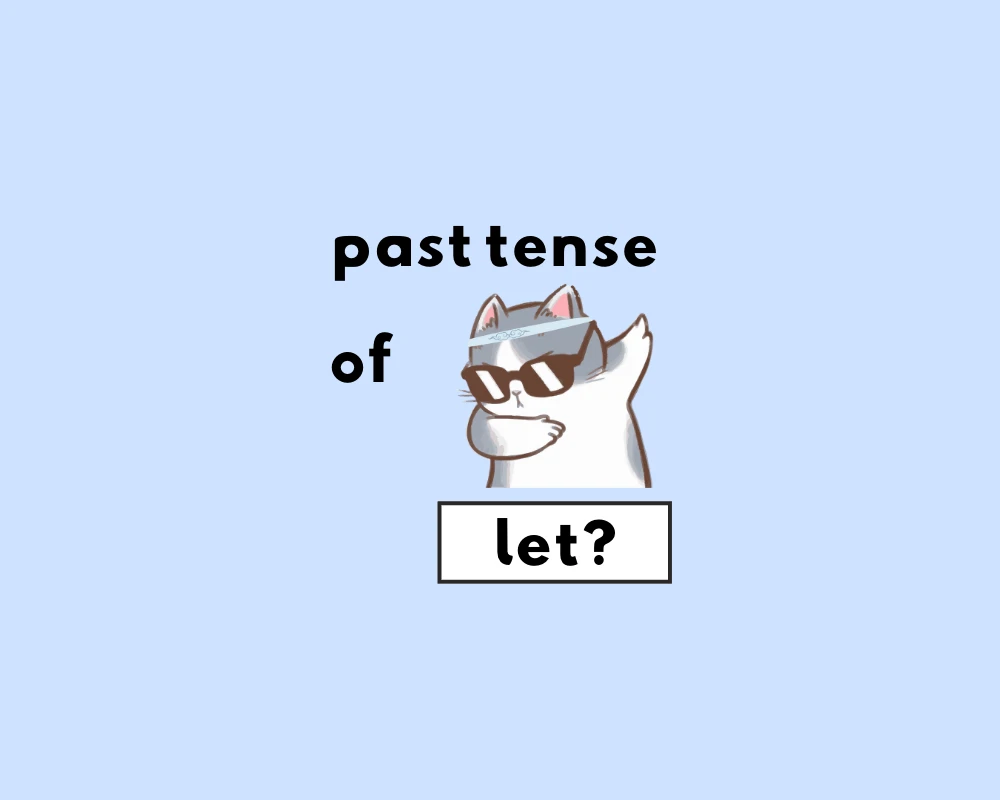
What’s the past tense of let?
Let is an irregular verb and only has one form in the past tense, i.e., let.
Let’s with an apostrophe is a contraction that combines the words let + us.
Avoid confusing let’s with an apostrophe with lets in the third-person present singular. Please, lettuce explain what Romaine’s; that is, the correct use of the verb and word, to let.
Verb forms of let
To define today’s topic first, let, as defined by Collins Dictionary, is understood as follows, ‘If you let something happen, you allow it to happen without doing anything to stop or prevent it: She let the door slam.‘
| present | past | future | |
| simple | I let | I let | I will let |
| continuous | I am letting | I was letting | I will be letting |
| perfect | I have let | I had let | I will have let |
| perfect continuous | I have been letting | I had been letting | I will have been letting |
1. To let uses the present tense: I love sweets but Mum doesn’t let me have them very often.
2. Let is the simple past: He stepped aside to let her pass.
3. Let is also the past participle: Our boss had been let go due to poor performance.
4. Letting is the present participle: We are letting them take the test again.
5. Lets is in the third-person present singular: If Dad lets us go to the movies without him, I’d be surprised.
Let’s with an apostrophe should not be confused with lets in the third-person present singular, as these are distinct forms of the verb. Let’s = let + us, and is a contraction; lets without the apostrophe indicates the third-person present singular form of the verb. See the difference:
He lets his kids eat candy whenever they want.
Let’s meet at 6 p.m.
Past tense vs. past participle of “let”
1. I let him use my car yesterday. (past simple)
2. I had better go and let the dog out. (past participle)
Participles pair with auxiliaries to form perfect or progressive tenses, as in the past perfect or past continuous. The past perfect or continuous show events from the past that either relate to the present, or progress into the present.
Verbs with one form (present & past)
| base verb | past tense | past participle |
| let | let | let |
| burst | burst | burst |
| bet | bet | bet |
| shut | shut | sunk |
| hit | hit | hit |
| set | set | set |
“Let”, used in sentences
1. I let myself into the flat.
2. Let me take your coat.
3. Let me get you something to drink.
4. The Americans won’t let her leave the country.
5. Will you let the dog out? (future simple)
Examples of let in sentences (past tense)
1. He stepped aside to let her pass.
2. I can’t let myself be distracted by those things.
3. They let us go to the movies on our own.
4. I let him use my car yesterday.
5. Because I let you use my car every day, I expect you to buy a tank of gas once in a while.
Examples sentences of let as a participle
1. Some children are spoilt because their parents let them do whatever they like.
2. I had to let them into the building because they had lost their keys.
3. I’d better go and let the dog out.
4. The guards were removing a section of fencing to let it through.
5. You had better not let this happen again.
Synonyms of let
- allow
- permit
- enable
- grant
- make
- cause
Origin of the verb let
From etymology online on let (v.):
Old English lætan (Northumbrian leta) “to allow; to leave behind, depart from; leave undone; bequeath,” also “to rent, put to rent or hire” (class VII strong verb; past tense let, leort, past participle gelæten), from Proto-Germanic *letan (source also of Old Saxon latan, Old Frisian leta, Dutch laten, Old High German lazan, German lassen, Gothic letan “to leave, let”).
Read about other irregular verbs
- What’s the Past Tense of Begin?
- What’s the Past Tense of Lose?
- What is the Past Tense of Teach?
- What’s the Past Tense of Read?
- What’s the Past Tense of Seek? Seeked or Sought?
- What’s the Past Tense of Buy? Brought or Bought?
- Take, Took, or Taken: What’s the Correct Past Tense of Take?
Sources
- Most material © 2005, 1997, 1991 by Penguin Random House LLC. Modified entries © 2019 by Penguin Random House LLC and HarperCollins Publishers Ltd
- Harper, Douglas. “Etymology of let.” Online Etymology Dictionary, https://www.etymonline.com/word/let. Accessed 21 February, 2023.
Work Sheet
According to the blog post, what is the past tense form of the verb “let”?
The blog post mentions that “let” is what type of verb, which explains its irregular past tense?
Which form represents the third-person present singular of the verb “let”?
The contraction “Let’s” is a shortened form of which two words?
In the sentence “Our boss had been let go,” what function does the word “let” serve?
Yesterday, I _______ the dog out for a walk.
She always _______ me borrow her books when I need them.
They _______ us leave early from the meeting last Friday.
_______ grab some coffee before the movie starts.
He stepped aside to _______ her pass through the narrow doorway.
Frequently Asked Questions
What is the past tense of let?
+
Is let an irregular verb?
+
How are “let’s” and “lets” different?
+
Is let used as a past participle?
+
Give a past tense example of let.
+
Yash, D. "What’s the Past Tense of Let?." Grammarflex, Jun 19, 2025, https://www.grammarflex.com/lets-let-or-letted-which-is-the-correct-past-tense-of-let/.
Sources
-
Most material © 2005, 1997, 1991 by Penguin Random House LLC. Modified entries © 2019 by Penguin Random House LLC and HarperCollins Publishers Ltd
-
Harper, Douglas. “Etymology of let.” Online Etymology Dictionary, https://www.etymonline.com/word/let. Accessed 21 February, 2023.











